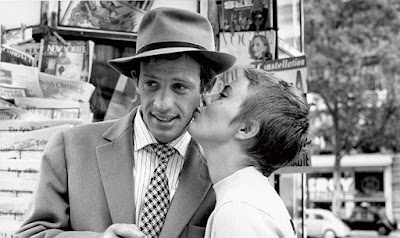Then again, here was a woman who, while lying on her deathbed, asked for a mausoleum bigger than Napoleon's and made sure her funeral through the streets of Buenos Aires would be something her people - and everyone else - would remember forever.
Smart lady.
In Alan Parker's lush and stunning film version of Andrew Lloyd Webber and Tim Rice's 1978 rock opera "Evita," the story of her rise from poverty to the Buenos Aires presidential palace is conveyed with such insight and complexity, one completely forgets (well almost, anyway) the original Broadway and London musical and all those divas who poured their hearts out in song singing "Don't Cry For Me Argentina," her triumphant but calculated confession to the masses who idolized and worshiped her.
Make no mistake about it, this is Madonna's show from start to finish. And the former Material Girl, garbed in more than 100 period couture costumes, gives a fierce, driven performance that captures the legendary, almost god like aura behind Eva Peron, her acquisition of power and glamour, her steel will to succeed no matter the cost and her ability to seduce an entire nation, who, upon her death, went to the Vatican seeking canonization.
Singing wise, the actress tackles the Webber/Rice score to this virtually dialogue-less musical with the vocal vigor and passion its creators intended (she's also been given a brand new song to sing titled "You Must Love Me," which reunites Webber and Rice after a ten-year creative separation), even though most of the high notes from the original score have been transposed to suit her non-belt range. Nonetheless, she's still the heart and soul of this big screen musical adaptation. And loving every minute of it.
Reworking "Evita" for the movies, Parker gives the production a fascinating size and scope that would be impossible to reproduce on the stage. For starters, his adaptation does not play like a two-hour MTV video. Nor does it have any gaps once the music stops.
This "Evita" also spends more time humanizing her seduction of Juan Peron, his rise to power as president of Argentina in 1946 and the couple's unquenchable thirst for glamour and the limelight at the expense of the masses. Che Guevara, who acts at the film's wry, sardonic observer, also has more to do in this production. With Parker at the helm, he's worked into the action without the slightest calculation. Even better, "The Lady's Got Potential," originally written for the 1976 concept album of "Evita" and sung by Che, is reinstated for the film version. It's a powerful musical number and one that heightens the film's political veracity.
There are many times throughout this "Evita" when one feels as if they are watching a glorious, opulent, sophisticated film opera rather than a musical based on a hit Broadway and London show.
That said, it's an obvious bonus that works surprisingly well on the big screen.
Just as the music and lyrics to Webber and Rice's potent score cascade flawlessly from one number to the next, so do Parker's indelible, moodily lit images. Every song and dramatic moment that flesh out the important commentary at hand - "Oh, What a Circus," "Buenos Aires," "A New Argentina," "Don't Cry For Me Argentina," "And the Money Kept Rolling In (And Out)," "You Must Love Me," to name a few - is augmented by sharp doses of wit, irony and criticism toward Juan Peron's totalitarian regime, his glamorous wife and her philanthropic foundations and Che's heated and wry observations about the actual story and its developments. Elsewhere, Parker's handling of the crowds, the opening funeral and the vigil outside the Casa Rosada is absolutely masterful and often photographed with a golden, luxuriant richness that works most advantageously.
As Che, the ever-changing, one-man Greek chorus who charts Eva Peron's life from a distance, Antonio Banderas sings, swaggers, broods and acts with consummate conviction. His Spanish accent brings a lusty quality to every one of the songs he sings, which when looking back, was noticeably absent from both the London and Broadway productions, based entirely on the show's casting choices. He also uses his obvious sex appeal to full advantage, a decision that brings a fiery intensity to his characterization.
One of the best films of 1996, this "Evita" is a stunningly crafted musical with exciting visuals and performances to accompany its wall-to-wall music, its highly passionate allure, its well-played pathos and the celebrity of both its leading man and lady. It properly rocks. It eschews the right attitude, smartness and expression. And finally, it respects the history and legacy of the original work, a timeless classic for all.
"Evita" (1996) stars Madonna, Antonio Banderas, Jonathan Pryce and Jimmy Nail. Directed by Alan Parker. Written by Tim Rice (book) and Alan Parker (screenplay). Running time: 135 minutes.
(This review was originally published on January 10, 1997)
(Additional changes, edits and new commentary were incorporated on June 28, 2020)
(Additional changes, edits and new commentary were incorporated on June 28, 2020)






































